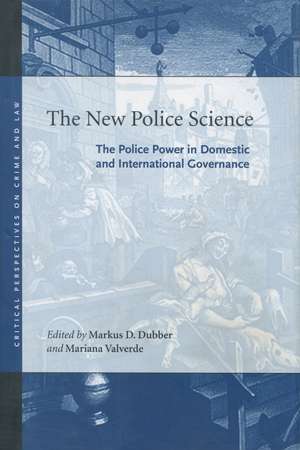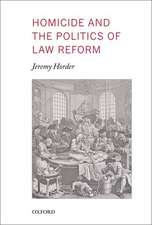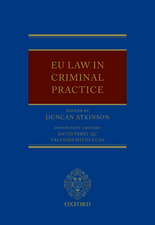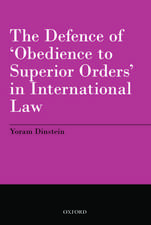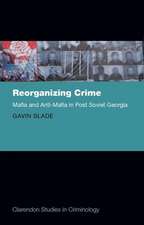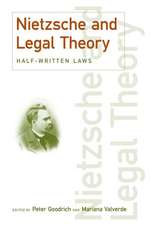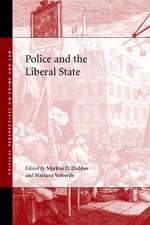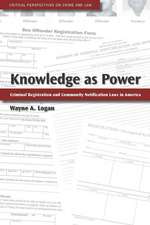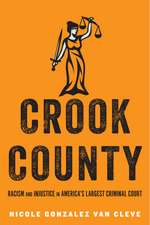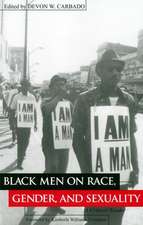The New Police Science: The Police Power in Domestic and International Governance: Critical Perspectives on Crime and Law
Editat de Markus Dubber, Mariana Valverdeen Limba Engleză Hardback – 10 oct 2006
This timely volume provides a critical analysis of the most comprehensive and least comprehended of state powers, the power to police, broadly understood as the power to maximize public welfare—or, more colorfully, its "peace, order, and good government."
Featuring contributions by leading scholars from several countries working in a variety of fields, including law, criminology, political science, history, sociology, and social theory, The New Police Science examines the power to police as a basic technology of modern government that appears in a vast array of sites of governance, including not only the state, but also the household, the factory, the military, and—most recently—the global realm of war, police actions, and peacekeeping. This volume resurrects and radically re-envisions the once thriving study of police science as a comprehensive critical inquiry into the nature of governance.
Featuring contributions by leading scholars from several countries working in a variety of fields, including law, criminology, political science, history, sociology, and social theory, The New Police Science examines the power to police as a basic technology of modern government that appears in a vast array of sites of governance, including not only the state, but also the household, the factory, the military, and—most recently—the global realm of war, police actions, and peacekeeping. This volume resurrects and radically re-envisions the once thriving study of police science as a comprehensive critical inquiry into the nature of governance.
Preț: 519.62 lei
Nou
Puncte Express: 779
Preț estimativ în valută:
99.43€ • 103.61$ • 82.33£
99.43€ • 103.61$ • 82.33£
Carte tipărită la comandă
Livrare economică 03-17 aprilie
Preluare comenzi: 021 569.72.76
Specificații
ISBN-13: 9780804753920
ISBN-10: 080475392X
Pagini: 320
Dimensiuni: 152 x 229 x 20 mm
Greutate: 0.56 kg
Ediția:1
Editura: Stanford University Press
Colecția Stanford University Press
Seria Critical Perspectives on Crime and Law
ISBN-10: 080475392X
Pagini: 320
Dimensiuni: 152 x 229 x 20 mm
Greutate: 0.56 kg
Ediția:1
Editura: Stanford University Press
Colecția Stanford University Press
Seria Critical Perspectives on Crime and Law
Recenzii
"This is an important book because it casts contemporary and historical
understandings of police, the police power(s) of states, and the meaning of the verb 'to police' into a new light. It brings together...a stunning
breadth of intellectual achievement."—Law and Politics Book Review
understandings of police, the police power(s) of states, and the meaning of the verb 'to police' into a new light. It brings together...a stunning
breadth of intellectual achievement."—Law and Politics Book Review
"This innovative collection of essays rescues the concept of police from its limited application with criminology and police studies, and insists on its importance to the social analysis of law, regulation, and government. The result is a significant and provocative social analysis of police power, broadly understood."—Ian Loader, Professor of Criminology, Director of the Oxford Centre for Criminology, and Fellow of All Souls College
"This terrific book brings together scholars from a range of disciplines who share a sense that police forces and the legal doctrine of the state's police power have a greater connection than is usually believed—that the common vocabulary reflects common roots in a particular worldview, which is profoundly antiliberal and antilegalistic."—David Alan Sklansky, Boalt Hall School of Law, University of California, Berkeley
Notă biografică
Markus D. Dubber is Professor of Law and Director, Buffalo Criminal Law Center at SUNY Buffalo School of Law. He is the author of The Police Power: Patriarchy and the Foundations of American Government (2005) and Victims in the War on Crime: The Use and Abuse of Victims' Rights (2002). Mariana Valverde is Professor at the Centre of Criminology, University of Toronto.
Textul de pe ultima copertă
“This innovative collection of essays rescues the concept of police from its limited application with criminology and police studies, and insists on its importance to the social analysis of law, regulation, and government. The result is a significant and provocative social analysis of police power, broadly understood.”—Ian Loader, Professor of Criminology, Director of the Oxford Centre for Criminology, and Fellow of All Souls College
“This terrific book brings together scholars from a range of disciplines who share a sense that police forces and the legal doctrine of the state's ‘police power’ have a greater connection than is usually believed—that the common vocabulary reflects common roots in a particular worldview, which is profoundly antiliberal and antilegalistic.”—David Alan Sklansky, Boalt Hall School of Law, University of California, Berkeley
“This terrific book brings together scholars from a range of disciplines who share a sense that police forces and the legal doctrine of the state's ‘police power’ have a greater connection than is usually believed—that the common vocabulary reflects common roots in a particular worldview, which is profoundly antiliberal and antilegalistic.”—David Alan Sklansky, Boalt Hall School of Law, University of California, Berkeley
Descriere
This interdisciplinary and international volume provides a critical analysis of the power to police as a basic technology of modern government found in a vast array of sites of governance, including not only the state, but also the household, the factory, the military, and—most recently—the global realm of war, police actions, and peace keeping.
